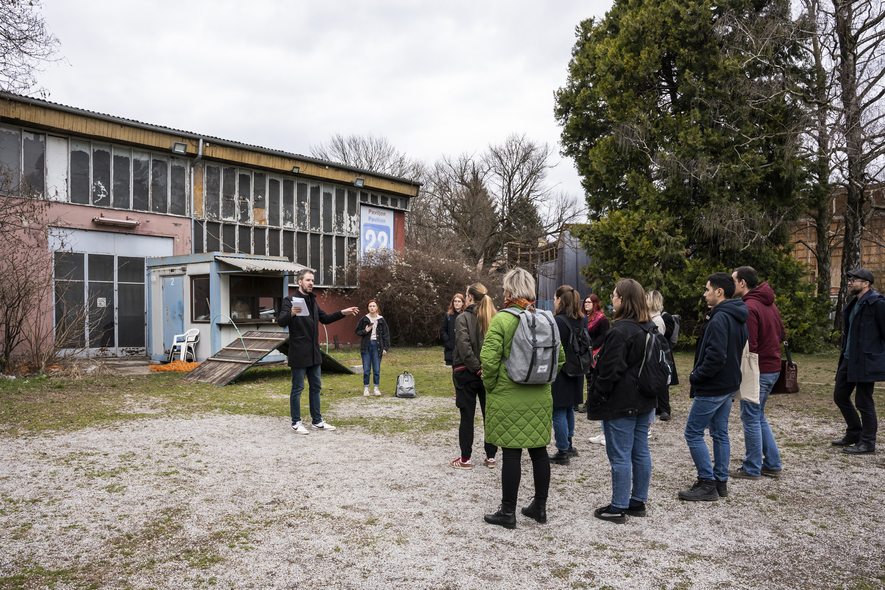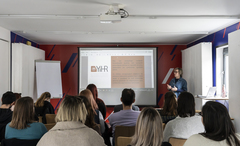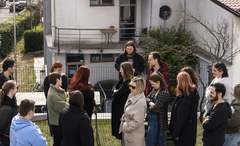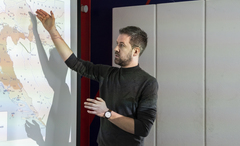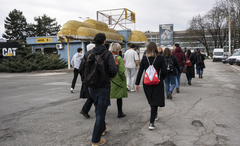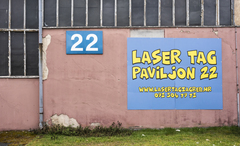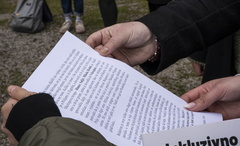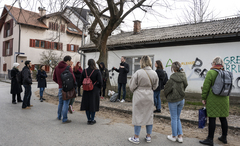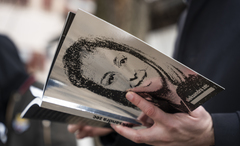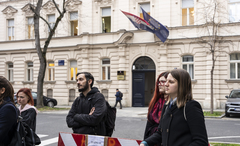Zagreb, March 1st, 2023
On Friday, February 24th, 2023, the Youth Initiative for Human Rights held an Educational-activist Day "Young People Remember the Forgotten" which involved seventeen young people from Zagreb.
"Young People Remember the Forgotten" is the first in a series of study visits organized by the Youth Initiative for Human Rights in order to inform the generations born after the wars about the events from the recent past that they are not introduced to during education, nor are they talked about in the public space. In this way, we want to encourage them to learn the whole truth about the 1990s and to respect all civilian victims of the war, regardless of their nationality, in order to build society of solidarity based on tolerance and human rights.
This Educational-activist Day dealt with the importance of equal approaches to memory through a local example of the neglected history of severe human rights violations against our fellow citizens, members of the Serbian national minority during 1991 and 1992.
What is memorialization, how do the politics of memory affect social relations, what is the relationship between the events of the past and the future, and what is the role of young people in this process? We talked about all this in the introductory part.
The central part of the day was a lecture by Nikola Puharić (Serbian National Council), who focused on the facts of the events, the socio-political context, and the examples of severe human rights violations against members of the Serbian national minority in Zagreb during the 1990s.
The activist part of the day, with which we concluded the meeting, consisted of visits to unmarked places of suffering and torture of civilians, the localities that the participants had the opportunity to hear about in the lecture. Specifically, we visited Pavilion 22 of the Zagreb Fair, the place where civilians were tortured and then taken to Pakracka Poljana. Then we visited Poljanička Street, where Mihajlo Zec was killed, and from where Aleksandra and Marija Zec were kidnapped and taken to Sljeme and killed. Finally, we visited Gajeva Street, where in front of today's State Attorney's Office building we remembered the events at the Military Court and the prison that was located there in the early nineties.
We also used this opportunity to advocate to the competent institutions the importance of appropriate marking of places that have marked our past, and represent its shameful part, precisely so that it does not happen again.
Looking back on this experience, the participants shared the following after the day spent together:
I learned a lot about Zagreb and some of the secrets it skillfully hides (behind makeup and laser tag advertising). As always, I am open to new knowledge about the history of the war, more specifically about that part that is often forgotten - the dirty deeds of "our" side over "theirs". I'm glad I had the chance to learn the darker details about my hometown.
I learned primarily how much can remain hidden in the past, i.e. how much from the nineties is not publicly available, i.e. you need to know very well where to look. This is exactly what motivates me, I would like to find out as much as possible about this (in)formal relationship of Croatia towards those it deemed unacceptable.
The workshop gave me a new perspective. I believe that it showed the importance of the fact that we must never forget innocent victims. In addition, the workshop emphasizes the importance of the fact that we as a society must seek justice for innocent victims, regardless of which side of the conflict they were on.
___________________________________________________
The Educational-activist day "Young People Remember the Forgotten" was held as part of the project "Inclusive Memory" financed by the competent office of the city of Zagreb and the project MLAD! - Think locally, influence actively funded by the Central State Office for Demography and Youth.
Photo: Sanja Bistričić
